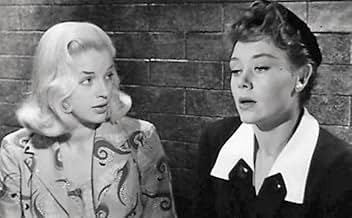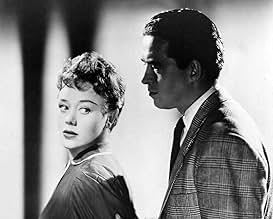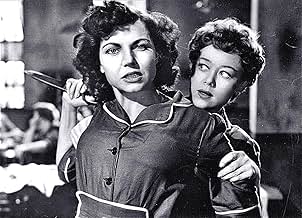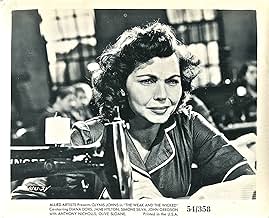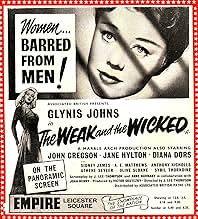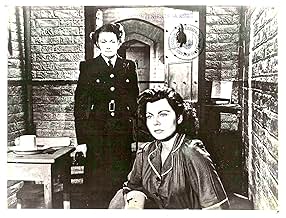AVALIAÇÃO DA IMDb
6,4/10
417
SUA AVALIAÇÃO
Adicionar um enredo no seu idiomaFrank "women in prison" story that sympathetically tracks several inmates through their imprisonment and subsequent return to society. Some are successfully rehabilitated; some are not.Frank "women in prison" story that sympathetically tracks several inmates through their imprisonment and subsequent return to society. Some are successfully rehabilitated; some are not.Frank "women in prison" story that sympathetically tracks several inmates through their imprisonment and subsequent return to society. Some are successfully rehabilitated; some are not.
- Direção
- Roteiristas
- Artistas
Avaliações em destaque
"The Weak and the Wicked" is a film adaptation of the semi-autobiographical novel by Joan Henry about her experiences while in prison. In real life, she was a debutante who spent more than she had and eventually went to jail for passing a bad check. In this film, Jean (Glynis Johns) has a gambling problem and does pass a bad check at the gambling hall...but ultimately she's jailed because the people she defrauded set her up for a petty theft/fraud charge. Once in prison, you see what life is like there as well as what led some of the women to prison as shown in flashbacks.
Choosing Johns to play the lead was a stroke of brilliance. After all, I cannot think of any actress of the day that looked more innocent and sweet than her...so her plight is made worse since she doesn't look like she should be there. I have no idea if the real life Joan Henry looked so innocent.
So is the film any good? Yes, but it's certainly not like some of the broadly written and acted American women in prison films of the 1950s (such as "Caged") or the REALLY over-the-top an crazed film in the genre that came out about 1970 (they were a REALLY sleazy lot). Now as far as it being an exposee, the women in the film actually seemed to be treated pretty well considering they were criminals...so it's not much of an exposee and is quite civilized. Interesting, yes, but not what many likely want to see in a women in prison film! So, even with sexy blonde Diana Dors (sort of the British version of Jayne Mansfield) in the film, it's NOT a sleazy skin flick nor exploitational in any manner. The worst treatment in the film was towards the end when Joan received a stern talking to by the warden!
If you do watch this film, about 3/4 of the way through the picture is a marvelous flashback involving an elderly woman planning on murdering her nasty husband. It was, by far, the best part of the movie and this story, expanded, would have made for a great film itself.
By the way, in one of the flashbacks you see the Baden family. While not listed in the credits or IMDB, the son, Bob, is played by Anthony Newley.
Choosing Johns to play the lead was a stroke of brilliance. After all, I cannot think of any actress of the day that looked more innocent and sweet than her...so her plight is made worse since she doesn't look like she should be there. I have no idea if the real life Joan Henry looked so innocent.
So is the film any good? Yes, but it's certainly not like some of the broadly written and acted American women in prison films of the 1950s (such as "Caged") or the REALLY over-the-top an crazed film in the genre that came out about 1970 (they were a REALLY sleazy lot). Now as far as it being an exposee, the women in the film actually seemed to be treated pretty well considering they were criminals...so it's not much of an exposee and is quite civilized. Interesting, yes, but not what many likely want to see in a women in prison film! So, even with sexy blonde Diana Dors (sort of the British version of Jayne Mansfield) in the film, it's NOT a sleazy skin flick nor exploitational in any manner. The worst treatment in the film was towards the end when Joan received a stern talking to by the warden!
If you do watch this film, about 3/4 of the way through the picture is a marvelous flashback involving an elderly woman planning on murdering her nasty husband. It was, by far, the best part of the movie and this story, expanded, would have made for a great film itself.
By the way, in one of the flashbacks you see the Baden family. While not listed in the credits or IMDB, the son, Bob, is played by Anthony Newley.
Aka The Weak and the Wicked. Socialite Jean Raymond is sentenced to 12 months for fraud. In flashback, she is revealed to be in gambling debts and refused to pay. The casino threatens unknown retribution and soon, she is framed for her fraud charge. In prison, she meets other prisoners who reveal their lives before prison in other flashbacks.
I find the prison drama rather rambling and non-dramatic. Some of the characters are interesting and the most interesting parts of the movie are a couple of the flashbacks. The structure of the movie may be problematic in maintaining dramatic drive for the central narrative. All in all, there are a few intriguing bits but the overall effect is less than expected.
I find the prison drama rather rambling and non-dramatic. Some of the characters are interesting and the most interesting parts of the movie are a couple of the flashbacks. The structure of the movie may be problematic in maintaining dramatic drive for the central narrative. All in all, there are a few intriguing bits but the overall effect is less than expected.
A peculiar mixture this, with an attempt to portray something of the reality of contemporary womens' prisons on one hand, combined with comedy flashbacks and a fictional approach to crime on the other.
The story centres around Jean Raymond (Glynis Johns) who is the subject of an elaborate frame when she can't pay her gambling debts. In reality, a half competent barrister could have destroyed the case against her, should it have ever come to court in the first place, but here she's sent down for twelve months. There follows her experiences in the grim Blackdown Jail and then The Grange, a progressive 'prison without bars'. Many of the usual clichés of such films are avoided and the staff are shown as being very strict, but fair. One of the comedy episodes features a comical family of shoplifters headed by Sid James and Olive Sloane; Sid's prominent position in the cast list, despite a relatively brief appearance, is notable even at this stage of his career. Another piece of nonsense has a wooden Sybil Thorndike attempting to murder her husband, and then framing Athene Seyler for blackmail. By contrast the scenes in the prison hospital are more realistic, with Jane Hylton giving perhaps the best performance as Babs, haunted by the death of the baby she had neglected. Though third billed, Diana Dors is not very memorable in what is little more than a supporting role. A couple of years or so later she was to give her finest performance for the same director in YIELD TO THE NIGHT.
The finale, with the orchestra in full flow, is as contrived and sentimental as anything that Hollywood could produce. Despite or because of its various eccentricities, I quite enjoyed this.
The story centres around Jean Raymond (Glynis Johns) who is the subject of an elaborate frame when she can't pay her gambling debts. In reality, a half competent barrister could have destroyed the case against her, should it have ever come to court in the first place, but here she's sent down for twelve months. There follows her experiences in the grim Blackdown Jail and then The Grange, a progressive 'prison without bars'. Many of the usual clichés of such films are avoided and the staff are shown as being very strict, but fair. One of the comedy episodes features a comical family of shoplifters headed by Sid James and Olive Sloane; Sid's prominent position in the cast list, despite a relatively brief appearance, is notable even at this stage of his career. Another piece of nonsense has a wooden Sybil Thorndike attempting to murder her husband, and then framing Athene Seyler for blackmail. By contrast the scenes in the prison hospital are more realistic, with Jane Hylton giving perhaps the best performance as Babs, haunted by the death of the baby she had neglected. Though third billed, Diana Dors is not very memorable in what is little more than a supporting role. A couple of years or so later she was to give her finest performance for the same director in YIELD TO THE NIGHT.
The finale, with the orchestra in full flow, is as contrived and sentimental as anything that Hollywood could produce. Despite or because of its various eccentricities, I quite enjoyed this.
Before he became popular directing Charles Bronson films, J. Lee Thompson directed two prison movies based on books written by his future wife, Joan Henry. Glynis Johns does very well as the gambler who is framed for insurance fraud and sent to prison for one year. Here she meets the inmates who relate their stories of crimes that sent them up for time: a shoplifter, a blackmailer, and a neglectful mother. She stops one from stabbing a cruel guard and is rewarded with a transfer to a prison without walls. It's also very touching in the visitation scenes with her fiancé and doctor (John Gregson) how she feels the stigma of her sentence from the outside world. Only beef with the film I have is that there is no flashback to explain what crime her best friend, Betty (Diana Dors) did to serve two years. Her chum is desperate to find a boyfriend, Norman, that never writes or visits.
As far as women's prison pictures go, this one is far from bad, thanks primarily to fine performances by its British cast. Glynis Johns, who is great throughout, plays a compulsive gambler who's framed by a vengeful casino owner for writing a bad check. That part of the plot doesn't ring entirely true, nor does her romance with her faithful boyfriend, but the assortment of Dickensian criminals she meets in jail are an entertaining lot. Especially wonderful is Sidney James and his family of shoplifters. Compared to some of the overwrought American pictures that have been made on this subject about "caged" women, this one is a real treat.
Você sabia?
- CuriosidadesJoan Henry's original novel 'Who Lie In Gaol' was based on her own experiences of prison. In debt from gambling, she took a forged cheque from a friend as a loan, and was convicted at the Old Bailey in 1951. Sentenced to twelve months, she served eight, primarily in Holloway Prison of which she was very critical, and later at Askham Grange Open Prison. The Glynis Johns character is based on her, although Henry thought her "a bit goody-goody".
- Erros de gravaçãoDuring the entire length of her prison term, Diana Dors maintains her artificially bleached and obviously waved hair style; Glynis Johns also maintains a more casual, but still very professionally maintained style from start to finish.
- Citações
Jean Raymond: No one wants to give a girl with no talent a job.
- ConexõesFeatured in A Bit of Scarlet (1997)
Principais escolhas
Faça login para avaliar e ver a lista de recomendações personalizadas
Detalhes
- Data de lançamento
- País de origem
- Idioma
- Também conhecido como
- Young and Willing
- Locações de filme
- Wilton Place, Knightsbridge, Londres, Inglaterra, Reino Unido(dress shop where Jean worked - exterior of The Berkeley Hotel.)
- Empresa de produção
- Consulte mais créditos da empresa na IMDbPro
- Tempo de duração1 hora 28 minutos
- Cor
Contribua para esta página
Sugerir uma alteração ou adicionar conteúdo ausente

Principal brecha
By what name was Pecadoras Inocentes (1954) officially released in India in English?
Responda
